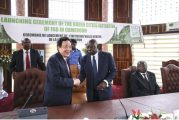Categories
Recent Posts
- Biya regime delays bond sale amid regional market strain
- Historic agreement between Nigeria and Cameroon to tackle wildlife crime
- Southern Cameroons refugees in Nigeria receive farm seedlings
- Douala: Investment Forum wraps up with honors for investment champions
- Understanding the Biya Francophone regime’s support for the Israeli genocide in Gaza
Archives
- April 2024
- March 2024
- February 2024
- January 2024
- December 2023
- November 2023
- October 2023
- September 2023
- August 2023
- July 2023
- June 2023
- May 2023
- April 2023
- March 2023
- February 2023
- January 2023
- December 2022
- November 2022
- October 2022
- September 2022
- August 2022
- July 2022
- June 2022
- May 2022
- April 2022
- March 2022
- February 2022
- January 2022
- December 2021
- November 2021
- October 2021
- September 2021
- August 2021
- July 2021
- June 2021
- May 2021
- April 2021
- March 2021
- February 2021
- January 2021
- December 2020
- November 2020
- October 2020
- September 2020
- August 2020
- July 2020
- June 2020
- May 2020
- April 2020
- March 2020
- February 2020
- January 2020
- December 2019
- November 2019
- October 2019
- September 2019
- August 2019
- July 2019
- June 2019
- May 2019
- April 2019
- March 2019
- February 2019
- January 2019
- December 2018
- November 2018
- October 2018
- September 2018
- August 2018
- July 2018
- June 2018
- May 2018
- April 2018
- March 2018
- February 2018
- January 2018
- December 2017
- November 2017
- October 2017
- September 2017
- August 2017
- July 2017
- June 2017
- May 2017
- April 2017
- March 2017
- February 2017
- January 2017
- December 2016
- November 2016
- October 2016
- September 2016
- August 2016
- July 2016
- June 2016
Featured
 Understanding the Biya Francophone regime’s support for the Israeli genocide in Gaza
Understanding the Biya Francophone regime’s support for the Israeli genocide in Gaza  Poverty under Biya: Cameroonians embrace Chinese language for brighter futures
Poverty under Biya: Cameroonians embrace Chinese language for brighter futures  Cameroon is broken: Who can fix it?
Cameroon is broken: Who can fix it?  Ethiopia: U.S Senator Cardin Statement on the Killing of Bate Urgessa
Ethiopia: U.S Senator Cardin Statement on the Killing of Bate Urgessa  Battle for the Unity Palace: ANNOUNCEMENT!
Battle for the Unity Palace: ANNOUNCEMENT!
Most Commented Posts
 4 Anglophone detainees killed in Yaounde
4 Anglophone detainees killed in Yaounde
19 comments Chantal Biya says she will return to Cameroon if General Ivo Yenwo, Martin Belinga Eboutou and Ferdinand Ngoh Ngoh are sacked
Chantal Biya says she will return to Cameroon if General Ivo Yenwo, Martin Belinga Eboutou and Ferdinand Ngoh Ngoh are sacked
13 comments Anglophone Nationalism: Barrister Eyambe says “hidden plans are at work”
Anglophone Nationalism: Barrister Eyambe says “hidden plans are at work”
12 comments The Anglophone Problem – When Facts don’t Lie
The Anglophone Problem – When Facts don’t Lie
12 comments Largest wave of arrest by BIR in Bamenda
Largest wave of arrest by BIR in Bamenda
10 comments
Latest Tweets
Featured
-

Biya regime delays bond sale amid regional market strain
-

Historic agreement between Nigeria and Cameroon to tackle wildlife crime
-

Southern Cameroons refugees in Nigeria receive farm seedlings
-

Douala: Investment Forum wraps up with honors for investment champions
-

Understanding the Biya Francophone regime’s support for the Israeli genocide in Gaza
-

US: Prosecution lays out ‘criminal conspiracy’ as Trump’s hush money trial opens
-

FAO formally launches Green Cities Initiative in Cameroon
© Cameroon Concord News 2024
28, December 2021
Ambazonia Crisis: Doctors Without Borders clarifies incident in transporting wounded patient in Manyu 0
by soter • Cameroon, Headline News, News
On Saturday, 25 December, the emergency call centre of the humanitarian medical organisation Doctors Without Borders/Médecins Sans Frontières (MSF) received a call related to a wounded person in need of urgent assistance in the Tinto health area. One of our ambulances managed to pick the patient up the next morning at Ashum area. Given his severe condition, he had to be transferred to Mutengene via Kumba for surgical attention.
As agreed and regularly done, MSF had contacted the local military authorities beforehand, informed them about the transfer of a wounded patient to Mutengene and shared the patient’s age and gender as requested. The ambulance was however stopped by Cameroonian security forces at the Nguti check point and forced to return to Mamfe, where the patient had to be treated and stabilised.
Since then, to avoid further incidents with our ambulances, we have been in touch with the authorities to understand the reason for the miscommunication with this reference.
Regarding this incident and the allegations published in some media, MSF reminds all relevant parties that:
1. In our work in Cameroon, and elsewhere in the world, MSF treats people based on medical need, regardless of their background or affiliations. This impartial and neutral medical humanitarian work is notably protected by the Geneva Conventions, which specify that persons taking no active part in the hostilities, including members of armed forces who have laid down their arms and those placed hors de combat by sickness, wounds, detention, or any other cause, shall in all circumstances be treated humanely, without any adverse distinction founded on race, colour, religion or faith, sex, birth or wealth, or any other similar criteria.
2. Hindering and obstructing our work puts patients’ lives at risk.
3. Allegations of complicity with any actor in a conflict puts patients and MSF staff in grave and immediate danger.
4. We appeal to everyone to be responsible in their statements and publications relating to our humanitarian action in the country. In an already very sensitive context, the spread of information that damages our reputation as a neutral, impartial and independent humanitarian organisation puts the lives of our teams and patients in danger.